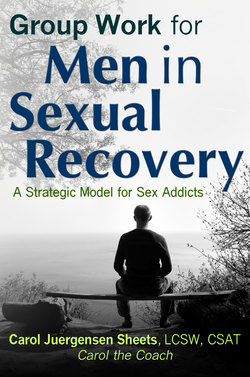Читать книгу Group Work for Men In Sexual Recovery: A Strategic Model for Sex Addicts - Carol Juergensen Sheets aka Carol the Coach - Страница 3
На сайте Литреса книга снята с продажи.
Оглавление+ Introduction +
Historically, sex addicts have had to rely on individual therapy and 12 Step support to enhance recovery. Group therapy was provided in residential and hospital settings but was not seen as essential in the individual practice. It has come to the attention of certification programs that group work is a crucial element to recovery. Addicts appreciate the opportunity to discuss their own traumas and share openly the emotionality that precedes healing from the trauma work. This kind of intense work requires the support of group intervention.
This style of group work was specially created for men to decrease reliance solely on individual therapy while clinically promoting the development of a support network in day-to-day life. Although group work for sex addicts may be seen as a luxury in the therapeutic community, I believe that it is essential to healing the shame and trauma that has occurred before the addiction and as a result of the addiction. This group work approach is therapeutically sound, cost-effective and time-limited.
This 15-week group approach teaches men the skills to manage anger, conflict resolution, and assertiveness. Perhaps the greatest outcome of this work has been that addicts learn how to use empathy in the group which they then apply outside of group. It also gives them a chance to deal with pivotal family-of-origin issues that move them into progressive stages of change. These men demonstrate compassion and insight which is then modeled by other group members and then in outside relationships. Once the core issues have been addressed and processed, the men are free to practice the life skills that they have learned and to improve their sense of self-worth and their relationships. Understandably, we want group participants to understand how this addiction has taken total control of their lives, and how important it is to do the healing work to both manage the illness and to heal the wounded soul that may have been a part of the trauma that contributed to the desire to self medicate and that may have been caused by the addiction itself.
In this manual you will learn creative strategies and actual exercises that utilize many of the concepts from Dr. Patrick Carnes' "Thirty Task Recovery Model." The manual also uses anchoring, visualization, role playing psychodrama, re-scripting, reframing, and meditation, as well as Gestalt techniques. Additional techniques are drawn from narrative therapy, metaphor therapy, hypnotherapy, and art therapy.
As the group identity is developed, men typically attend two or three 15-week group series which allows for threading the needs of the individual men to further enhance goal completion. Due to men attending multiple group series, balancing the needs of "rookie" versus "veteran" members is of utmost clinical importance. This further reinforces the importance of having good solid sobriety, because veterans can not only be a support, but share their wisdom as to how they were able to attain sobriety. Anyone who works with this population knows that recovering from a process addiction requires a multitude of life skills and rituals that reinforce recovery.
This manual illustrates how to utilize this dynamic group approach, which improves clinical outcomes and recovery.
Breaking the Chains of Isolation, Shame and Secrecy
Addicts are notorious for coming to group with intense sadness and shame. They have lived a long period of secrecy which has put them into emotional isolation and contributed to their emotional intimacy disorder. Although most men have found much relief from 12 step work as they see that they are not alone with their feelings; they are working with a sponsor and the group to put into action a 12 step recovery plan that attends to their desire for abstinence. Many of these men have needs for intensive therapy to heal the wounds of their childhood and to do deep repair work to enhance their sense of self and their relationships.
Recurrent and predictable themes that are present in men's lives include:
•Fear of Intimacy
•Self-Esteem
•Feeling Identification
•Abuse Issues
•Family of Origin Issues
•Trust
Clearly this is not an exhaustive or inclusive list, yet these themes present themselves repeatedly in an addict's life and when addressed in a group setting, allow the addict to practice healthy recovery skills that break the chains of the behaviors, and feelings that contributed to the sexual addiction. Group members will be expected to do the work in and outside of the group. They may be given homework assignments that may be addressed in group or may build the foundation for future group exercises.
The Value of Group Exercises
Group exercises teach men valuable skills that include learning how to:
•Contain someone's anger without internalizing it.
•Build conflict regulation and resolutions skills.
•Identify the 5 primary emotions (anger, sadness, loneliness, fear and unhappiness) to reduce feelings of shame and guilt.
•Process feelings in healthy ways.
•Assert and communicate their feelings and needs.
•Develop and embrace their own self-identity as a man in recovery vs. the addict.
•Enhance their character strengths which empower them to create the life they have envisioned as a man of integrity.
•Eliminate or manage depression and anxiety.
•Decrease isolation, shame, and secrecy.
•Increase the ability to show empathy to increase relationship skills.
